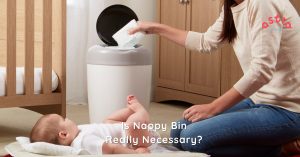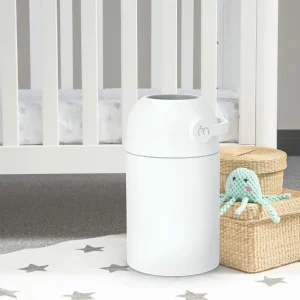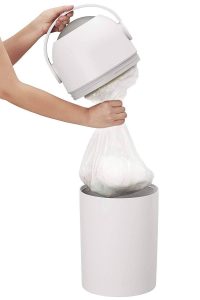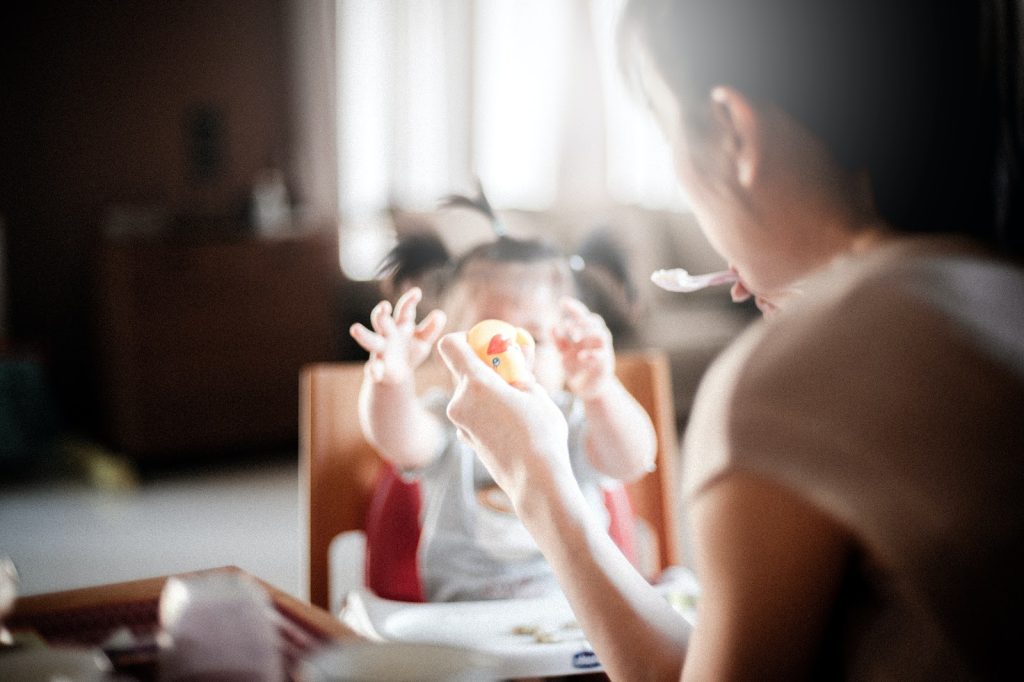
Many parents share the struggle with the unpleasant scent of dirty diapers. If you’re not using washable nappies, consider the challenge of having dirty nappies hanging around for a fortnight between rubbish collections. A simple solution is a nappy bin, making life easier and keeping your nursery fresh. In this article, we will discover why nappy bin is a parenting need for odor-free diaper disposal.
The Importance of Hygiene in the Nursery:
Ensuring the cleanliness and hygiene of your baby’s nursery is vital for their health and the household. Babies are particularly prone to germs and infections, underscoring the importance of a sanitary environment. Dirty diapers are a primary contributor to bacteria and unpleasant odors in the nursery. Effective diaper disposal is key to preventing germ transmission and preserving a nursery that smells fresh.
Average diapers used in a day:
Infants (2 – 4 months): Can go up to 10 diapers/day or 300 diapers/month
Babies (5 to 8 months): Up to 9 diapers/day or 270 diapers/month
Babies (9 to 12 months): May require up to 7 diapers/day or 210 diapers/month
Pros & Cons
This section will discuss the contrasts between a nappy bin and a regular bin. It’s crucial for parents to understand the benefits and drawbacks before choosing a bin for your baby’s diapers.

Nappy Bin
Pros:
- Effectively contains and minimizes diaper odors.
- Designed for easy disposal of diapers, minimizing mess.
- Typically designed with larger capacity for diapers.
- Sealed system reduces exposure to germs and bacteria.
- Long-term savings on bags.
- Easy to maintain.
Cons:
- A unit may cost more than a regular bin.
- Require occasional cleaning.
Regular Bin
Pros:
- Standard bin with regular bag expenses.
- Easy cleaning, less specialized for diapers.
Cons:
- Limited odor control; may result in unpleasant smells.
- May require additional steps for proper diaper disposal.
- Limited capacity; may fill up quickly with diapers.
- Open design may expose contents, leading to hygiene concerns.
The Challenges of Diaper Disposal:
a. Odor Problem:
One of the biggest challenges parents face when it comes to diaper disposal is the strong and discomforting odor. Even if you dispose of the diaper in a regular trash can, the smell can quickly spread, making the entire room unpleasant. Traditional trash cans lack the proper design and technology to contain the odor effectively.
b. The Convenience Factor:
Another challenge with diaper disposal is the convenience factor. When you’re in the middle of changing a diaper, the last thing you want is to have to search for a trash can and deal with the hassle of opening it and potentially getting your hands dirty. It’s important to have a convenient and efficient method of disposing of dirty diapers that doesn’t interrupt your diaper changing routine.
The Benefits of Using a Nappy Bin:
a. Odor Control:
One of the main advantages of using a nappy bin is its ability to control and contain odors. Nappy bins are specially designed to trap and neutralize the smell of dirty diapers, keeping your nursery fresh and odor-free. Most nappy bins use advanced odor control technology, such as multi-layered bags, carbon filters, or scented liners, to effectively eliminate unpleasant smells.
b. Hygienic Design:
In addition to odor control, nappy bins also offer a hygienic design that helps prevent the spread of germs and bacteria. Most nappy bins have a fully-covered lid, preventing the bin from attracting pests that potentially carry diseases. This helps to minimize the risk of cross-contamination and maintains a clean and germ-free environment at home.
c. Easy Disposal:
Nappy bins are designed for convenience and ease of use. They typically have a one-handed operation, allowing you to open and close the bin effortlessly while holding your baby. Many nappy bins also offer a smooth bag removal system, making it quick and easy to dispose a full bag without any mess or hassle.
Choosing the Right Nappy Bin for Your Needs:
a. Size and Capacity:
When choosing a nappy bin, it’s important to consider the size and capacity that will suit your needs. The bin should be large enough to hold an adequate number of diapers without needing frequent emptying, especially during the night. However, it should also be compact enough to fit in your nursery without taking up too much space.
b. Odor Control Technology:
Different nappy bins use various odor control technologies to keep the smell contained. Some bins have carbon filters that absorb and neutralize odors, while others use scented liners or bags that release a pleasant fragrance. Consider your preferences and the effectiveness of the odor control technology when selecting a nappy bin.
c. Ease of Use and Maintenance:
Look for a nappy bin with a user-friendly design that makes it easy to use and maintain. Features such as a foot pedal for hands-free operation, a childproof lock to prevent accidental spills, and a removable inner bin for easy cleaning can make your experience much more convenient and hassle-free.
Tips for Using and Maintaining Your Nappy Bin:
#1 Proper Diaper Wrapping Technique:
To maximize the odor control capabilities of your nappy bin, it’s important to practice proper diaper wrapping technique. Ensure the diaper is tightly sealed and wrapped before disposing of it in the bin. This will prevent any odor from escaping and keep the bin smelling fresh.
#2 Regular Cleaning and Sanitization:
To maintain a hygienic environment, it’s essential to clean and sanitize your nappy bin regularly. Empty and clean the bin when it’s full, and disinfect it with baby-safe cleaning products to prevent the buildup of germs and bacteria. Regular maintenance will ensure the longevity and effectiveness of your nappy bin.
#3 Using Deodorizing Inserts:
To further enhance odor control, you can use deodorizing inserts or sachets in your nappy bin. These inserts are specifically designed to absorb and neutralize odors, keeping your nursery smelling fresh and clean. Simply place the insert in the bin or attach it to the lid for continuous odor protection.
Conclusion:
Investing in a nappy bin is a game-changer for parents who want to eliminate the unpleasant odor associated with diaper disposal. By choosing the right nappy bin and following proper maintenance and disposal techniques, you can enjoy a fresh and odor-free nursery environment. Say goodbye to holding your breath and say hello to stress-free and hygienic diaper changes with a nappy bin. Your baby and your nose will thank you!



